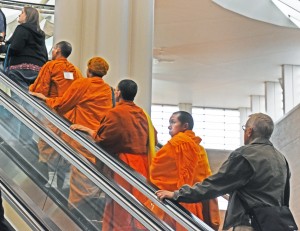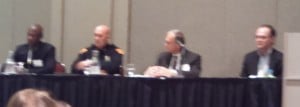In 2012 the suicide rate among combat veterans reached an all-time high with some 22 veterans dying by their own hand every single day. Deaths to suicide among these veterans were actually higher than combat-related deaths that year in both Iraq and Afghanistan. Despite efforts by the Veteran’s Administration and other agencies, suicide deaths among combat veterans continues to be a major problem with approximately one veteran suicide every hour. This rate is twice that of those who never served in combat.
We have long grown accustomed to dealing with the physical wounds of warfare in our veterans. And, since Vietnam, we have been aware of the emotional wounds dealt to our veterans after serving in a combat situation. What we have not looked at or given a name to in our attempts to reach out to returning warriors was what participation in warfare does to the soul and to the moral foundation that is shaken to its roots by combat.
The concept of “Moral Injury” is a new term which describes the effect on the soldier of being asked to go against all of the moral tenets with which he or she has grown up. In asking a soldier to be willing to kill or maim another individual we ask them to take on the burden of blood guilt, something which has been recognized for thousands of years as placing a stain upon the spirit. In spite of this we, unfortunately, seem to expect the combat veteran to return home unchanged by what he or she has experienced. We fail to recognize or we conveniently ignore the soul-deep wound this person has sustained.
Moral injury is different from the previously identified Post-Traumatic Stress Disorder, but the two diagnoses are often found in conjunction with one another. Their impact on the returning combat veteran can be crippling and even deadly. The Huffington Post ran an excellent article speaking to the nature of Moral Injury in a series of articles that can be found at http://projects.huffingtonpost.com/moral-injury
Last week I was fortunate enough to attend a two-day seminar based on a program through the Soul Repair Center at Brite Divinity School at Texas Christian University called, “Bringing Them All Back Home.” This program calls upon clergy of all faiths, and on those who are as troubled as I am by the terrible suicide rate among returning veterans, to create out-reach programs to help our veterans return home in body, mind, and spirit.
The program included information on moral injury and on PTSD. It also contained information on how churches and other groups might develop programs to reach out to veterans and their families to help them understand both the concept of moral injury and offer then ways to find their way back to spiritual health. Most touching were the personal stories of the five combat veterans who were willing to share the pain and guilt that they had carried with them, often for many years, over their actions while engaged in warfare.

At the conclusion of the seminar we sat in the beautiful chapel faced with a table on which were placed a pair of combat books and a helmet, symbols of those who have died as a result of the wounds they carried, whether visible or invisible. The service began with the singing of Amazing Grace, followed by readings of texts of lamentation from many spiritual paths including Christian, Hindu, Buddhist, Wiccan, Jewish, and others. We lighted candles to illuminate the darkness of the soul caused by moral injury and brought home evergreen boughs as a token of life. The service concluded with readings of texts of hope and promise from a variety of religions. I don’t think that anyone who attended this seminar left without the determination to reach out in whatever way they could to the veterans in their communities.
The seminar was also a wonderful example of humans reaching out to other humans in love, compassion, and understanding. It didn’t matter what faith we followed. It didn’t matter by what name we called upon the Divine. Here in this place and in the programs we wished to set in motion all that mattered was trying to help a wounded Warrior make it back home. Setting aside our differences we were able to work together for the common good. And isn’t this what interfaith work is all about?
For those who are interested in attending similar seminars of who would like further information on the topic of Moral Injury, I would recommend the resources listed by the Soul Repair Center at http://brite.edu/academics/programs/soul-repair/
(Image taken by myself in September 2014)












